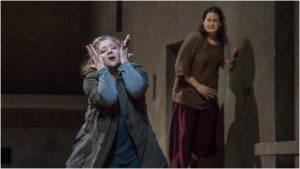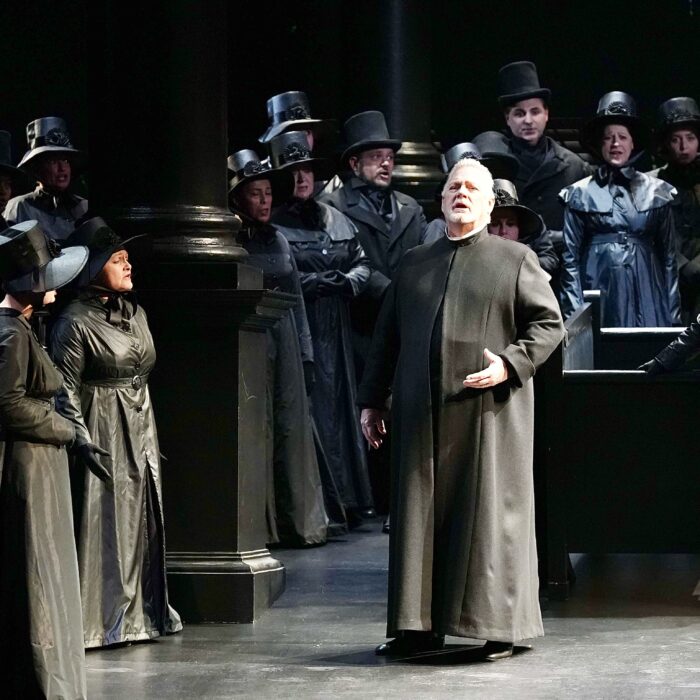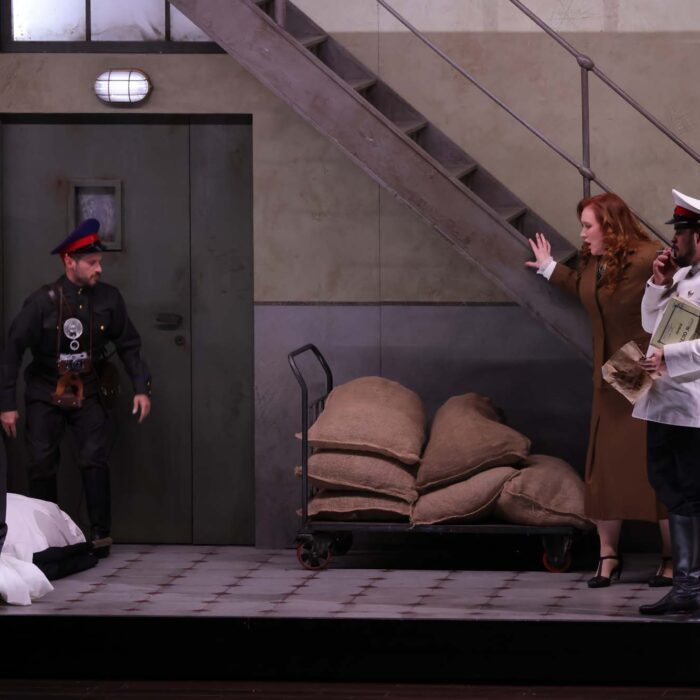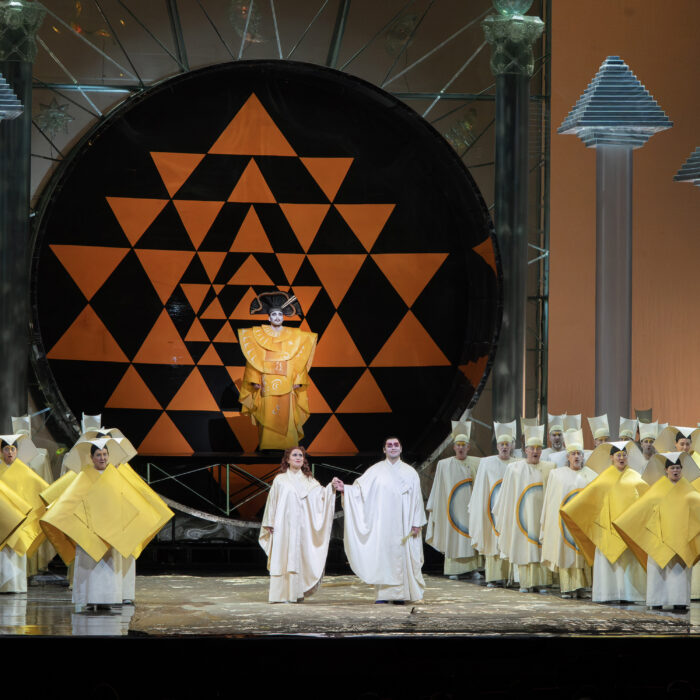
Metropolitan Opera 2017-18 Review – Elektra: Yannick Nézet-Séguin Steals The Show In Strauss’ Most Violent Work
By David SalazarRichard Strauss’ “Elektra” returned to the Metropolitan Opera on Thursday, March 1, 2018, in a hotly anticipated revival of Patrice Chéreau’s production.
Last time out, the production was a smash hit, its stripped-down sets allowing for the audience to focus on the violent drama put before us. It continues to work in that vein, though its overall stillness might not be apt for some audiences.
Horror Film Embodied
Its most effective moment is undeniably its opening. The lights go out in the Met auditorium and everything is black as the curtain rises. We see the set divided up into higher and lower areas with only a set of stairs connecting them. A servant is wiping down the stairs in an incessant moment that grows irritating; almost the way Elektra’s hatred is eating at her. As an audience member, you are constantly waiting for the music to start in an opera and the increased silence generates more and more tension. The cleaning continues with no music to be found, the tension growing as it would in a horror film where you know the scare is coming but are still waiting for it. And when you least expect it, the orchestra screams with fury the famous opening light motif that comes to represent Agamemnon. It’s impactful and effective, though the production never quite lives up to that potent opening.
It is laden with symbolism despite its stripped-down perspective. The lower level (and closer one) of the stage represent Elektra’s domain and her standing among the people in the “castle.” She is seen as lower and more grotesque than even servants and even has a hole in the ground from where she starts her opening monologue. The other major characters appear from the upper level, expressing the distancing from the eponymous figure of the opera.
The grey and brown palette lends the environment a dirty feel that emphasizes the damaged internal world of the characters. Everyone here is dirtied by the murder of the patriarch; no one can escape the trauma of the action. Only death can set them free.
The production’s most effective element, however, was its performers.
Women Dominate Men
As Chrysothemis, Elza van den Heever was a revelation and arguably the scene-stealer of the night. Every time she opened her mouth, you just shifted all your attention and energy to her. It is a glorious sound that carries beautifully into the hall, no matter how demanding the orchestra is being in the moment. Every sound she uttered was ravishingly beautiful and she played up the legato singing that Strauss gives her character almost exclusively. There was arguably no passage more glorious than “Kinder will ich haben.” She stood up to the more wildly unpredictable Elektra throughout the night, never pulling away from a fight. It gave the character added dimension and a strong sense of internal conflict – she wants to help her sister and craves vengeance too, but she is not quite as extreme and won’t descend to the depths of murder to achieve those goals.
As Klytämnestra, Michaela Schuster impressed mightily in her belated Met debut. She has a massive instrument that carries throughout the hall with boundless resonance, especially in the lower range where she spends most of her time in this part. Her interpretation of the queen showcased her as rather weak and conflicted. In her lone encounter with Elektra, she never looked like she was in control. She was either chasing after her crazed daughter or running from her.
The male roles didn’t quite impress as much. Mikhail Petrenko did possess a booming bass as Orest, but his singing throughout was not particularly varied in terms of vocal colors. He seemed like the menacing agent of death, but never like a full-blooded being trying to connect to his mortified sister. As Aegisth, Jay Hunter Morris’ tenor sounded opaque and unsteady. The clarion and powerful bite it once had when he was the reigning Siegfried not so long ago seems to be gone.
Physical Embodiment With Vocal Restraint
At the end of the day, however, this opera comes down to one person.
In the lead role, Christine Goerke embodied Elektra physically quite potently. Physicality represented a major part of how she imbued this anti-heroine with life, her body slumped at times as she walked about. It set her apart from other characters and emphasized this sense of Elektra shutting others out. She tended to spend a great deal of time on the floor on the lower level of the stage, emphasizing how she’d fallen lower than every character in the story; even the “servants” stood over her. Most characters, with the exception of Chrysothemis, would initiate interactions with her from the upper level of the stage, only descending to her level to seek out her help. In the case of Aegisth, his entrance marks the first time that Elektra climbs the stairs and finds herself “above” him to start a scene. It so happens that she’s already won. Goerke’s Elektra was vicious as she looked about with a hateful glare in the opening and grew more and more erratic throughout her opening monologue Allein! Weh ganz allein!” As that section reached the climax, in which Elektra swears to dance on the grave of her transgressors, Goerke initiated a ritualistic stomping of feel; the “dance” was more vicious and out-of-control. At the close of the opera, when she “dances” in victory, she looks like she has no control over herself or her body. In fact, one gets the sense, that she is being controlled by some out-of-body experience. Is it Agamemnon? Is it the fact that Elektra, even in her victory, cannot shake off the violence? It was hard to tell, but as showcased by Goerke it gave off a hallucinogenic feel that bordered on awkward and uncomfortable for the viewer. It expressed the fact that Elektra’s victory was a pyrrhic one and that despite finally claiming victory over those who made her suffer, her being was unable to exist without the ongoing violence growing within her. Without the hope of vengeance, she cannot survive. And hence, as the opera closes, she collapses dead on the floor. And this violent nature was borne out of most of the opera where we saw Goerke easily excitable and attacking other main characters, notably her mother Klytämnestra and Chrysothemis.
Vocally Goerke was more of a mixed bag. The role is known by many as the most difficult in the entire repertoire and is a renowned voice-killer. Many have sung Elektra early in their careers and then sung nothing else. Goerke has already performed the role 11 times since September in productions at Houston and San Francisco and with last night’s showcase her 12th in just under half a year. She is slated for six shows and may be doing her utmost to preserve her voice for what should be a grueling month. Unlike Houston and San Francisco, the Met is a cavern of an auditorium and the role calls for close to two hours of intense high-octane singing that hangs in the passagio and beyond. Elektra has one high note after another and is constantly asked to sing over one of the largest orchestras ever put together for an opera. Goerke wasn’t always up to the task and often found herself covered by the oceanic sound. Such was the case throughout the “Was bluten muss,” one of the longer solo sections for the singer, or the B flat on “Sie verflucht,” or the final “Ob ich nicht höre.” In her middle range she managed to cut through quite well but it was her higher notes that didn’t quite carry. For most of the evening, Goerke’s voice seemed to thin out and grow softer and more careful as she ascended into the high notes. Where most singers would throw caution to the winds to hit the high notes with force, Goerke seemed careful. Maybe too careful. For example, “Der jauchzt,” one of the most iconic high Cs in the score, didn’t quite project. Maybe she is thinking ahead to the remaining five performances. But in the orchestra section, they didn’t quite carry; another writer for OperaWire was seated in the family circle and also assured me that they didn’t carry to the top of the theater either. When juxtaposed with the singing of other colleagues on the night, whose voices did carry quite potently, the overall lack of power from Goerke was quite noticeable.
But that isn’t to say that the soprano wasn’t a force in some moments. Her opening monologue was arguably her finest moment vocally, the very first “Allein” booming through quite menacingly. Throughout the extensive passage her voice built up furiously, the articulation of the text growing more pointed and the high notes vicious and powerful. The high C at the climax of this section on “Königliche” landed quite well and the ensuing G natural on “Siegenstänze” was even more visceral. The climax of “Was bluten muss,” four straight G sharps (and an A flat) on “und sehdich endlich sterben” was exciting in Goerke’s decision to take it all in one breath, generating tremendous tension and adding to the sense of violence in her singing. The recognition scene, where Elektra finally gets long, delicate legato lines carried well and for those moments, Goerke drew us in with more gentle timbre. Her voice shifted into a brighter and flightier sound in her scene with Aegisth, one feeling the sense of restrained joy from the victory.
It should be interesting to see how Goerke’s work evolves over the course of the run and if her growing comfort with the production, orchestra, and especially, theater, allow her to show less restraint in her singing overall.
The Star of the Night
In the pit, Yannick Nézet-Séguin continued his conquest of Met audiences with a brutally rich rendition of one of the most difficult scores written in human history. Unlike “Parsifal,” which he conducted earlier this year with great restraint, here he is unbridled and overenthusiastic throughout, letting the orchestra rip with vicious sound at the numerous climaxes. The build-up throughout Elektra’s opening monologue was visceral and seemed to prop up Goerke to her most effective singing. Klytämnestra’s march-like entrance also grew more and more violent until exploding with chaos and fury at its climax. The opera’s grand finale soared without restraint. Not to mention that it all came with exquisite polish from the Metropolitan Opera Orchestra. There was no noticeable miscue or missed note. That isn’t to say that the playing was only effective when loud. The quieter sections, particularly the Recognition Scene were mesmerizing. In this particular moment, Nézet-Séguin’s expansive phrasing made it feel like time stood still for Elektra and put the listener in a trance. In an opera that almost always seems to be in a hurry (try following the score with any recording and you’ll know what I mean), this relaxation was simply awe-inspiring. Don’t forget that the conductor is still quite young. If this is how he makes this orchestra sound now, then imagine the sublime quality one can look forward to as he and the ensemble mature together. It was, beyond any doubt, his night.
It’ll surely be interesting to see how Goerke’s interpretation evolves over the course of the run as it ultimately comes down to your experience of her portrayal that determines the satisfaction of the viewer. On the evidence of her first night, she might split some. Yet, it is impossible not to admire her work in arguably the hardest role conceived for any singer.


